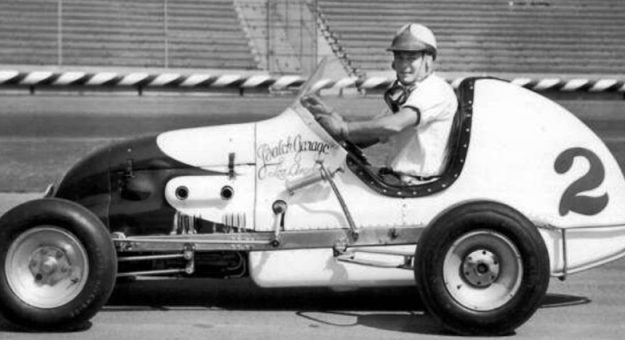“When I started racing,” recalled Danny Oakes just before his death, “my mother told me, ‘Danny, you’re going to get killed in those damn race cars, just like all the rest of them.’ I told her, ‘Mom, some do and some don’t. I’m going to be one that doesn’t.’”
He didn’t.
And Oakes didn’t merely survive, he thrived in sprint cars, midgets and AAA championship cars. He performed well in them all, but his forte was the midgets. He won more than 150 midget features, three championships and the Turkey Night Grand Prix.
Once he reached the top of the heap in those diminutive racers, he made his way to Indianapolis as a driver, and, uniquely, as an award-winning mechanic.
Oakes first climbed in a race car at California’s Legion Ascot Speedway in 1933.
“Ascot had three classes of what we called big cars, sprint cars today,” explained Oakes. “I started at the bottom and worked up. I ran pretty good until they shut the track down because so many guys were getting killed.
“Ascot ran AAA races,” Oakes continued. “But when the track closed, I ran outlaw cars. Hell, I had to run something. Then, about 1937 the midgets got my attention.”
The search for midget rides led him first to Sioux City, Iowa, where he won the1938 track championship against giants such as Harry McQuinn, “Cowboy” O’Rouke and Wally Zale.
The opportunities in midget racing during those pre-World War II years were phenomenal. In late 1938, Oakes headed back to the West Coast for a ride in Danny Hogan’s well-regarded Offy. Then in 1940, Mel Hansen called him to race his car in Detroit before he swung back to California to drive for Ronney Householder.
As good as the racing was, even headier times came following the war. New tracks sprouted like mushrooms following a spring rain. Packed stadiums seven nights a week generated fat purses.
In 1945, Oakes was in the middle of that action. He finished second in the URA points and won the Turkey Night Grand Prix at Gilmore Stadium. 1946 brought prestigious wins at the Los Angeles Coliseum and the Rose Bowl. In 1947, he claimed the AAA West Coast championship and pulled down $25,000 in earnings.
Oakes said there was no secret to avoiding the calamities of the era.
“No secret,” insisted Oakes. “To win you have to take chances, but I knew when I should, and when I shouldn’t. I’d take what I could get. Some called me chicken, but you don’t win 150 races by being chicken. Besides, I’ve lived a long life that I’ve enjoyed immensely. A lot of them aren’t around to say that.”
Success in the midgets carried him to the AAA Championship trail.
“I bet I drove 1,300 laps at Indianapolis but never made the race,” cracked Oakes. “One year I was to get $500 for being Ascari’s co-driver. I showed up, they disappeared and Ferrari still owes me 500 bucks.”
Although Indy eluded him as a driver, he became one of its best mechanics, wrenching for the likes of Johnny White, Bill Cheesbourg, Troy Ruttman and Jim Hurtubise.
Oakes arrived at Indy in 1960 as a mechanic and the reigning USAC Pacific Coast Midget champion. He was there to maintain Ernie Ruiz’s beautiful pearlescent lavender roadster handled by Hurtubise.
“Jim ran a lot of laps over 147mph, but nobody paid much attention because he was a rookie,” recalled Oakes. “And he had an unusual groove that I constantly fought to keep officials off his back about. He was cocky. He congratulated Sachs for winning the pole, and then said to him, ‘By the way, I’m going to blow you right off that pole.’ Sachs had a big ego and had a fit. But when Jim shattered his record, Sachs was the first to congratulate him.”
On race day, Hurtubise moved quickly forward, putting himself in contention for the win. A cracked oil tank ended his day, however.
“Racing could be brutal, but I still loved it,” remarked Oakes.
Oakes died on Jan. 13, 2007. He was 95 and had outlived five wives and most of his competitors. He had no regrets.
